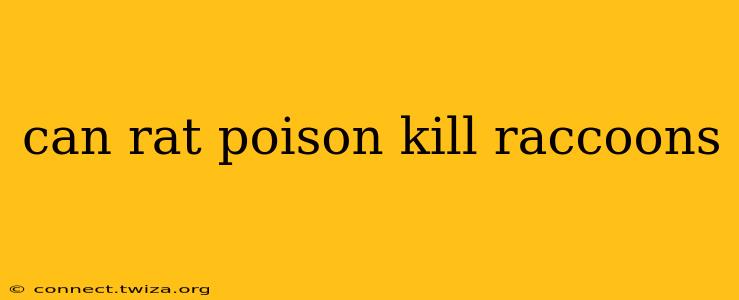Can Rat Poison Kill Raccoons? Understanding the Risks and Responsibilities
The short answer is: yes, rat poison can kill raccoons, but using it to do so is generally not recommended and often illegal. While rodenticides are designed for rodents, raccoons, being opportunistic omnivores, can easily ingest them, leading to serious health consequences and potentially death. This article will explore the reasons why you should avoid using rat poison to control raccoon populations and discuss safer, more humane alternatives.
What Happens If a Raccoon Eats Rat Poison?
Raccoons, like many other animals, are susceptible to the anticoagulant poisons commonly found in rat poison. These poisons prevent blood clotting, leading to internal bleeding and eventual death. The symptoms can be gradual and agonizing, including weakness, lethargy, internal bleeding, and ultimately, organ failure. The severity of the effects depends on the type of poison, the amount ingested, and the raccoon's size and overall health.
Is it Legal to Use Rat Poison to Kill Raccoons?
The legality of using rat poison to kill raccoons varies depending on your location and specific regulations. In many areas, it's illegal to intentionally kill or harm wildlife without proper permits or licenses. Using rat poison indiscriminately can lead to accidental poisoning of other animals, including pets, and even humans, resulting in significant legal repercussions and potential fines.
What are the Safer Alternatives to Rat Poison for Raccoon Control?
Instead of resorting to potentially harmful and illegal methods, consider these safer and more humane alternatives for dealing with raccoon problems:
-
Exclusion: The most effective long-term solution is to prevent raccoons from accessing your property in the first place. This involves sealing up any potential entry points into your home or attic, securing garbage cans, and removing attractants like pet food.
-
Repellents: Various commercial and homemade repellents can deter raccoons from specific areas. These often rely on strong smells or tastes that raccoons find unpleasant. However, their effectiveness varies, and consistent application is key.
-
Trapping and Relocation: If you have a persistent raccoon problem, you can contact your local animal control agency or a licensed wildlife removal specialist. They can safely trap the raccoon and relocate it to a suitable habitat away from human settlements. This is a humane method that avoids killing the animal.
-
Professional Pest Control: Hiring a professional pest control service specializing in wildlife removal is often the best option. They have the experience, equipment, and knowledge to handle raccoon issues safely and effectively while adhering to local regulations.
What Should I Do If I See a Raccoon That Appears Poisoned?
If you suspect a raccoon has ingested rat poison, do not attempt to handle it yourself. Raccoons can be aggressive when sick or injured. Contact your local animal control agency or a wildlife rehabilitation center immediately. They are equipped to handle such situations safely and provide appropriate care for the affected animal.
How Can I Prevent Raccoons from Getting into My Garbage?
Securely closing garbage cans is crucial. Consider using heavy-duty cans with tightly fitting lids or storing garbage in a secure shed or garage until trash collection day. Regularly cleaning up any spilled food or garbage will also help minimize raccoon attraction.
What are the Signs of Raccoon Poisoning?
Signs of raccoon poisoning can be subtle initially, progressing to more obvious symptoms. These can include weakness, lethargy, difficulty walking, bleeding from the nose or mouth, and unusual behavior. If you observe these symptoms in a raccoon, contact your local animal control or wildlife rehabilitation center immediately.
In conclusion, while rat poison can kill raccoons, it's a dangerous, inhumane, and often illegal approach to dealing with raccoon issues. Prioritizing prevention, employing humane deterrents, and contacting professionals for assistance are the responsible and ethical ways to manage raccoon populations and protect both wildlife and humans.
